
 Being at the epicentre of organised sport, National Federations (NFs) face numerous professional, commercial and governmental pressures from a complex set of stakeholders. NFs strive to deliver a dual mission of developing both participation and elite sport, which requires strategic choices about resource investment. With few exceptions, they are also highly dependent on public funding, thus vulnerable to the State’s policy priorities that mostly concentrate on elite sport, rewarding ‘medal’ results over participation (Green & Collins, 2008; Green, 2005, 2007; Houlihan & Green, 2008, 2010; Phillips & Newland, 2013). In many countries talent identification programs and high performance initiatives therefore receive the majority of the funding (Green, 2007; Houlihan & Green, 2008; Oakley & Green, 2001; Phillips & Newland, 2013).
Being at the epicentre of organised sport, National Federations (NFs) face numerous professional, commercial and governmental pressures from a complex set of stakeholders. NFs strive to deliver a dual mission of developing both participation and elite sport, which requires strategic choices about resource investment. With few exceptions, they are also highly dependent on public funding, thus vulnerable to the State’s policy priorities that mostly concentrate on elite sport, rewarding ‘medal’ results over participation (Green & Collins, 2008; Green, 2005, 2007; Houlihan & Green, 2008, 2010; Phillips & Newland, 2013). In many countries talent identification programs and high performance initiatives therefore receive the majority of the funding (Green, 2007; Houlihan & Green, 2008; Oakley & Green, 2001; Phillips & Newland, 2013).
Questions have been raised about the return on public investment (De Bosscher, De Knop, Van Bottenburg, & Shibli, 2006; Green, 2007; Houlihan & Green, 2008), the distortion caused by concentrating on a narrow band of priority sports, often with small popularity and participation levels, and the lack of public funding of NFs who do not meet the performance benchmark and/or are not priority sports (Australian Institute of Sport, 2015; De Bosscher & Van Bottenburg, 2010; Girginov, 2008; Oakley & Green, 2001). Challenges arising from elite/mass agendas are key to NF’s legitimacy and effectiveness (Phillips & Newland, 2013). However, it is crucial to understand how NFs respond to such pressures so that they can be more successful and, therefore, sustainable into the future (Washington & Patterson, 2011).
Through the lenses of institutional theory, utilising the institutional logics perspective (Thornton, Ocasio, & Lounsbury, 2012) and building on the work of institutional complexity (Greenwood, Raynard, Kodeih, Micelotta, & Lounsbury, 2011), the research aims to identify how NFs deal with these different priorities and the strategies they use to maintain long-term viability. A longitudinal case study was undertaken using the Portuguese Triathlon NF due to their performance in financial autonomy, high performance results and participation rates. The ongoing data collection comprises the period between 1989 (NF foundation) and 2015, and it includes interviews with the Secretary of State and the head of the sport institute, as well as with NF’s president, CEO and heads of the different departments. It also includes document analysis such as annual reports, strategic plans, job descriptions, press releases and social media. Policy analysis covers legislation, regulation and contracts. Implications for sport management research, practice, and education are discussed.
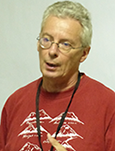 France is an important historical place in the international Olympic movement, due to the tutelary figure of Baron Pierre de Coubertin, founder of the renovation of the Olympic Games, and co-founder of the International Olympic Committee. Moreover, the French remains one of the four official languages of the IOC.
France is an important historical place in the international Olympic movement, due to the tutelary figure of Baron Pierre de Coubertin, founder of the renovation of the Olympic Games, and co-founder of the International Olympic Committee. Moreover, the French remains one of the four official languages of the IOC.
France has also contributed to the reputation of the event by getting several times the organization of the Summer Olympics (Paris, 1900, 1924) and Winter Olympics (Chamonix 1924; Grenoble 1968; Albertville 1992), and it was defeated candidate many times. Despite or because of five recent failures (Summer Olympics 1992, 2008, 2012 with Paris, and 2004 with Lille; 2018 Winter Olympics with Annecy), France is once again a candidate to host the Olympic and Paralympic Games, those of summer 2024 again with the city of Paris.
The purpose of the communication is to analyze the reasons for such insistence, the arguments justifying such application, and the strategies put in place, despite several failures over the past three decades:
To try to answer these questions, taking as example the case study of the future Paris bid for the 2024 Olympics and Paralympics, we will analyze five interrelated aspects:
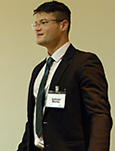 This study justified itself by the encouragement of using procedures for evaluating results, through the Olympic Values Inventory (OVI) as a fundamental tool for a full development of programmes based on Olympic Education (OE). The OVI is an instrument that measures the Olympic Values: Friendship, Respect and Excellence. There are 41 items, divided into blocks. Each item is to be answered using a Likert scale type. The general objective is to test the metric principles defined in content validity of the OVI. Following guidelines from the literature (Pawlowski, Trentin & Bandeira, 2007; Cronbach 1988; Dassa 1999; Balbinotti, 2005) we can state, that only starting from valid and reliable instruments, it is possible to move forward in the study of values. Therefore, it is necessary to prepare an instrument that follows psychometric guidelines, well defined methodological steps and rigorous procedures, and has content validity as its initial objective. Thus we used a validation method known as Content Validity Coefficient (CVC), established by Hernandez-Nieto (2002). It was created for watching over more adequately to the specific needs of validation of a given content (Cassepp-Borges, Balbinotti & Teodoro, 2010).
This study justified itself by the encouragement of using procedures for evaluating results, through the Olympic Values Inventory (OVI) as a fundamental tool for a full development of programmes based on Olympic Education (OE). The OVI is an instrument that measures the Olympic Values: Friendship, Respect and Excellence. There are 41 items, divided into blocks. Each item is to be answered using a Likert scale type. The general objective is to test the metric principles defined in content validity of the OVI. Following guidelines from the literature (Pawlowski, Trentin & Bandeira, 2007; Cronbach 1988; Dassa 1999; Balbinotti, 2005) we can state, that only starting from valid and reliable instruments, it is possible to move forward in the study of values. Therefore, it is necessary to prepare an instrument that follows psychometric guidelines, well defined methodological steps and rigorous procedures, and has content validity as its initial objective. Thus we used a validation method known as Content Validity Coefficient (CVC), established by Hernandez-Nieto (2002). It was created for watching over more adequately to the specific needs of validation of a given content (Cassepp-Borges, Balbinotti & Teodoro, 2010).
The first, qualitative, phase of this study was composed of five evaluation participants—Masters or Doctors with wide-ranging knowledge in the Olympic Studies area in Brazil. The evaluators were asked, as per the recommendations of the relevant literature, about the clarity and the relevance of each item. Therefore, from these procedures and established correlations between the responses of the evaluation particpants, it became possible to assemble a collection instrument with valid content data. This Inventory was twice sent for evaluators’ analysis. The feedback received during the first evaluation indicated a need for adjustments to some items. The subsequent second analysis of the OVI and the results of the CVC with regard to relevance and clarity were satisfactory, considering that, to be a valid instrument at the point of view of content, it is necessary to reach a desired score (≥0.8).
 These results show that as far as the clarity and appropriateness of content items is concerned, the OVU is an instrument ready to applied. This will enable a better understanding of the populations examined (that is, individuals older than twevle years who participate in sportive-social projects). This instrument is now intended to be applied to the referenced population and therefore verify their difficulties in understanding the items. This step will be useful for the quantitative phase of the project, in order to calculate the exploratory factor analysis (reducing items and evaluating how items fit to the factors) together with the Cronbach's alpha. In Cronbach's alpha calculation, all of the correlations between each item score and the total score of other items are calculated, so that items not heavily correlated with the others can be eliminated from the measure in order to increase overall reliability (Martins, 2006; Pasquali, 2001; Hill, 2008).
These results show that as far as the clarity and appropriateness of content items is concerned, the OVU is an instrument ready to applied. This will enable a better understanding of the populations examined (that is, individuals older than twevle years who participate in sportive-social projects). This instrument is now intended to be applied to the referenced population and therefore verify their difficulties in understanding the items. This step will be useful for the quantitative phase of the project, in order to calculate the exploratory factor analysis (reducing items and evaluating how items fit to the factors) together with the Cronbach's alpha. In Cronbach's alpha calculation, all of the correlations between each item score and the total score of other items are calculated, so that items not heavily correlated with the others can be eliminated from the measure in order to increase overall reliability (Martins, 2006; Pasquali, 2001; Hill, 2008).
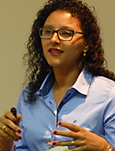 The sports administrator Avery Brundage played a decisive role in the founding of the Pan-American Games. Following initial enthusiasm for inaugurating Pan-American Games in the 1930s and 1940s, the idea finally materialized in 1951, in Argentina. Brundage's idealistic view of sports and the Olympic Movement was implicated in the foundation of the hemispheric event along with diplomatic interests of enhancing Inter-American relationships. He saw in the Pan-American Games an opportunity to promote the Modern Olympic Movement’s rules and ideals throughout Latin America.
The sports administrator Avery Brundage played a decisive role in the founding of the Pan-American Games. Following initial enthusiasm for inaugurating Pan-American Games in the 1930s and 1940s, the idea finally materialized in 1951, in Argentina. Brundage's idealistic view of sports and the Olympic Movement was implicated in the foundation of the hemispheric event along with diplomatic interests of enhancing Inter-American relationships. He saw in the Pan-American Games an opportunity to promote the Modern Olympic Movement’s rules and ideals throughout Latin America.
The World War II context and its political outcome made international sports contests increasingly attractive to national governments. Observant of the political implications of sports, many countries in the world asserted direct governmental control over their National Olympic Committees and other sport organizations. Latin Americans throughout Central and South America came through the control of military and dictatorial regimes that placed sports directly under the aegis of governments. It was within that context that the Pan-American Games materialized and developed.
This paper aimed to explore the implications of the political environment in the Peronist Argentina for the inauguration of the Pan-American Games in 1951 as well as the specific actions, interventions, and interactions that characterized Brundage’s position before those events. The research material was mainly drawn from primary sources, most importantly, those found in the Avery Brundage Collection at Western University, Canada. In general, this research demonstrated that Brundage’s thoughts that politics should be removed from sports contrasted to president Juan Domingo Perón’s view that athletes were important agents to project a positive image of Argentina abroad. Perón, over the course of his presidency, secured ways to control sports by appointing political cronies in sport federations and organizations.
The data gathered in this study provides evidence suggesting that although Brundage had clear signs of the government’s direct participation in the preparations of the Pan-American Games in Argentina, he did not take any action aimed at minimizing the government’s intervention in the preparations for the event. The overall success of the first Pan-American Games strengthened the aspirations of sport authorities to host the Olympics in South America. A precedent was established: successfully hosting the Pan-American Games boosted the interest and confidence of sport and political authorities of cities aspiring to host the Olympic Games. On the other hand, the Games served International Olympic Committee authorities as an assessment of the Olympic Movement and amateur sport progresses in that region of the world.
Over the course of time, Latin America’s attention to the Modern Olympic Movement has advanced from merely participating to hosting different types of Olympic events. Investigating historical events that have influenced the configuration of the relationship between Latin America, the Modern Olympic Movement, and its Games, is crucial for understanding how they are perceived, and scrutinized within the contemporary sporting culture of the region.
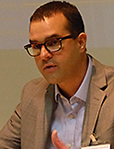 Puerto Rico became a colony of the United States in 1898, yet Puerto Rican nationalists actively advocated for independence throughout the twentieth century, most predominantly by the Partido Nacionalista of the 1930s and the Movimiento Pro Independencia of the 1960s. At the height of Puerto Rican nationalist activity, and contextualized in a Latin American movement to define national identities, Puerto Ricans began participating in the Olympic movement by attending the Central American and Caribbean Games (CACG) in 1930. Thus, Olympic sport became a key component in the development of a national identity, albeit under colonialism in a process called “colonial Olympism.” During the 1930s and 1940s, the nationalists viewed the Olympic delegation (and U.S. sports in general) as an imperial tool of Americanization, given that Puerto Rico at these Games represented the United States. By the 1950s, and with the establishment of the Estado Libre Asociado (Commonwealth) of Puerto Rico in 1952, the nationalists faced fierce repression while Puerto Rico’s Olympic movement negotiated the thin line between cultural nationalism and political nationalism. In this regard, it was permissible under the Commonwealth to celebrate the Olympic delegation as an expression of Puerto Rican culture, but not to use it to demand political emancipation. Recognizing the power of the Olympic movement in the struggle for national liberation, the nationalists by the 1970s fully used Puerto Rico’s national Olympic delegation as the embodiment of the occupied nation in need of freedom, while the pro-Commonwealth/autonomy advocates cheered the delegation to argue that the nation existed and competed without the need of independence. A prominent figure in this study of the shifting meanings of Olympism for decolonization is Juan Juarbe Juarbe, a nationalist-athlete and flag bearer (U.S.) for Puerto Rico during the 1930 CACG. Juarbe Juarbe became a leading figure among the nationalists, serving as Secretary of Foreign Relations for the Partido Nacionalista after the 1940s, and displaying anti-colonial acts during Puerto Rico’s Olympic participations.
Puerto Rico became a colony of the United States in 1898, yet Puerto Rican nationalists actively advocated for independence throughout the twentieth century, most predominantly by the Partido Nacionalista of the 1930s and the Movimiento Pro Independencia of the 1960s. At the height of Puerto Rican nationalist activity, and contextualized in a Latin American movement to define national identities, Puerto Ricans began participating in the Olympic movement by attending the Central American and Caribbean Games (CACG) in 1930. Thus, Olympic sport became a key component in the development of a national identity, albeit under colonialism in a process called “colonial Olympism.” During the 1930s and 1940s, the nationalists viewed the Olympic delegation (and U.S. sports in general) as an imperial tool of Americanization, given that Puerto Rico at these Games represented the United States. By the 1950s, and with the establishment of the Estado Libre Asociado (Commonwealth) of Puerto Rico in 1952, the nationalists faced fierce repression while Puerto Rico’s Olympic movement negotiated the thin line between cultural nationalism and political nationalism. In this regard, it was permissible under the Commonwealth to celebrate the Olympic delegation as an expression of Puerto Rican culture, but not to use it to demand political emancipation. Recognizing the power of the Olympic movement in the struggle for national liberation, the nationalists by the 1970s fully used Puerto Rico’s national Olympic delegation as the embodiment of the occupied nation in need of freedom, while the pro-Commonwealth/autonomy advocates cheered the delegation to argue that the nation existed and competed without the need of independence. A prominent figure in this study of the shifting meanings of Olympism for decolonization is Juan Juarbe Juarbe, a nationalist-athlete and flag bearer (U.S.) for Puerto Rico during the 1930 CACG. Juarbe Juarbe became a leading figure among the nationalists, serving as Secretary of Foreign Relations for the Partido Nacionalista after the 1940s, and displaying anti-colonial acts during Puerto Rico’s Olympic participations.
This paper will analyze the role that the Olympic movement played in Puerto Rican nationalists’ freedom struggles, in the construction of Puerto Rican national identity, and in the broader process of decolonization. From rejecting American sports as cultural tools of U.S. imperialism and ignoring Puerto Rican Olympic participation during the 1930s, by the 1970s a new generation of nationalists welcomed sports and celebrated the Olympic delegation as an expression of the Puerto Rican nation. I will argue that the Olympic movement is another site to observe issues of imperialism, decolonization, and competing notions of nationalism. By allowing Puerto Ricans (as one example in a larger group of similar non-independent nations) to participate in Olympic competition, the Olympic movement fostered cultural nationalism and undermined political independence. Using educational journals, newspapers, memoirs, pamphlets, bulletins, unpublished manuscripts, U.S. Federal Bureau of Investigation (FBI) files, personal and official correspondence, and photographs this paper analyzes the shifting meanings of Olympism and sport in the creation of a Caribbean nation. It will underscore the ways in which Olympic sport played a key part in anti-colonial struggles, ultimately serving as a tool to legitimize both colonialism and nationalism.
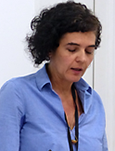 The Olympics today are in a juncture. A rising wave of concerns regarding the way the Olympic Games are implemented in the socio-spatial environment of a host city indicates the fragility of the social contract between the Olympics and its constituents. Based on the study of the role of design/sociotechnical action in Olympic dissent from the 1960s to the present, and focusing on selected cases such as those of the Vancouver 2010 and the London 2012 Olympics, this paper will map possibilities for the Olympics evolving into an inclusive operation, open to the participation of all its stakeholders. The purpose of this paper is neither to assert the type of political action that is most suitable for the proposition of alternatives or improvements, nor to propose the content of such a negotiation. Rather, drawing from the history of Olympic dissent, the aim is to entertain three plausible, and potentially overlapping, scenarios of political contestation that might guide the future of the Olympic Games, and speculate on the role of design and sociotechnical action in these processes.
The Olympics today are in a juncture. A rising wave of concerns regarding the way the Olympic Games are implemented in the socio-spatial environment of a host city indicates the fragility of the social contract between the Olympics and its constituents. Based on the study of the role of design/sociotechnical action in Olympic dissent from the 1960s to the present, and focusing on selected cases such as those of the Vancouver 2010 and the London 2012 Olympics, this paper will map possibilities for the Olympics evolving into an inclusive operation, open to the participation of all its stakeholders. The purpose of this paper is neither to assert the type of political action that is most suitable for the proposition of alternatives or improvements, nor to propose the content of such a negotiation. Rather, drawing from the history of Olympic dissent, the aim is to entertain three plausible, and potentially overlapping, scenarios of political contestation that might guide the future of the Olympic Games, and speculate on the role of design and sociotechnical action in these processes.
The first scenario arises from the demands-based approach common in today’s oppositional politics surrounding the Olympics. This form of action extends demands for improvement of the Olympic city and its operation during the Games but also sets new standards for the post-Olympic era.
The second scenario, based on the idea that the values of liberal democracy can change the Olympics from within, presents a process of “agonistic pluralism” (Chantal Mouffe) as a participatory template for building the Olympic city. Within this paradigm, design is the medium that rearticulates signifiers into new symbolic forms that simultaneously establish the democratic and the liberal pluralistic frameworks to which Olympism aspires. The model sees the Olympics as an opportunity to instill a necessary tension among the demos of the Olympic host city and those challenging it, to account for sub-national communities and groups that might be neglected or considered as outsiders, as well as to revisit the national narrative.
The third scenario ultimately resists the current nation state-based framework of the Olympics, and is mobilized by affinity groups that work either autonomously or in solidarity. Based on prefigurative politics, this model uses direct action to construct alternatives to the Olympics, or to envision new types and spaces of sport events. For both, design in its wider definition can play an important role, as a means of imagining and prototyping a different Olympic future, or for developing new proposals that depart radically from the idea of Olympism.
In speculating on the potential future topography of the Olympics, the paper advocates more inclusive processes of participation in the Olympic making that take into account the realm of contestation that is activated by local and transnational groups. Whether the Olympic city will claim one permanent home, rotate globally in a supersized or downsized version, or prefigure a model of an agonistic, equitable, ethical urbanity is a decision that should be assigned to the wider socio-political milieu.
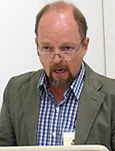 Sport is widely understood as a means for education in values. In this context, it arises as an axiological metalanguage (DaCosta, 2012). One of several formats and possibilities in values education through sport is the so-called Olympic Education. One can define Olympic Education as a set of educational proposals through sport which we take the Olympic Movement, its values, symbolism, history, heroes and traditions as reference points. According to Naul (2008), there are four distinct approaches to Olympic education: The “knowledge-oriented” approach seeks to explain Olympic values by means of its historical and educational legacy. The “experience-oriented” approach emphasizes participation in “Olympic” festivals and competitions. The “physical achievement-oriented” approach focuses on the idea that individual and social development occurs through performing and competing in fairness and mutual respect. Finally, the “lifeworld-oriented approach “links the Olympic principles to children’s and young people’s own social experience in sport with their experiences in other areas of their lives” (2008, 119). However, some scholars have pointed to the lack of conclusive evidence of the effects of education through sport, while recognizing their educational potential (Bailey, 2005; Stegeman, Janssens, 2004; Stigger, Thomassim, 2013). Regarding the educational legacy of mega events, Graver et al. (2010: 20) concluded that because of a lack of consistent evaluation, it is difficult to precisely quantify the level of educational benefit delivered by any particular event.
Sport is widely understood as a means for education in values. In this context, it arises as an axiological metalanguage (DaCosta, 2012). One of several formats and possibilities in values education through sport is the so-called Olympic Education. One can define Olympic Education as a set of educational proposals through sport which we take the Olympic Movement, its values, symbolism, history, heroes and traditions as reference points. According to Naul (2008), there are four distinct approaches to Olympic education: The “knowledge-oriented” approach seeks to explain Olympic values by means of its historical and educational legacy. The “experience-oriented” approach emphasizes participation in “Olympic” festivals and competitions. The “physical achievement-oriented” approach focuses on the idea that individual and social development occurs through performing and competing in fairness and mutual respect. Finally, the “lifeworld-oriented approach “links the Olympic principles to children’s and young people’s own social experience in sport with their experiences in other areas of their lives” (2008, 119). However, some scholars have pointed to the lack of conclusive evidence of the effects of education through sport, while recognizing their educational potential (Bailey, 2005; Stegeman, Janssens, 2004; Stigger, Thomassim, 2013). Regarding the educational legacy of mega events, Graver et al. (2010: 20) concluded that because of a lack of consistent evaluation, it is difficult to precisely quantify the level of educational benefit delivered by any particular event.
Recently, the lack of assessment and sound evidence concerning the effects of education and development through sport became part of the concerns of the International Olympic Committee in relation to the legacy of the Olympic Games. Such concerns have led to some of the goals defined in Agenda 20+20.
The official Olympic Education program of the Rio 2016 Olympic Games is the Transforma (Transform) Program. Its stated educational aims are:
The aim of this paper is to critically examine Transforma, questioning the program’s theory and mechanisms. To achieve this goal, we will take the four approaches to Olympic education proposed by Naul and the pedagogical principles of education in values proposed by Puig (1998) as references. Our hypothesis is that the mechanisms adopted by the programme are contradictory to the declared pedagogical theory and that such phenomena would limit their educational legacy.